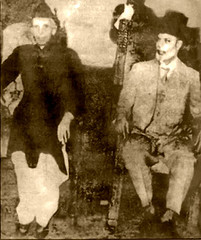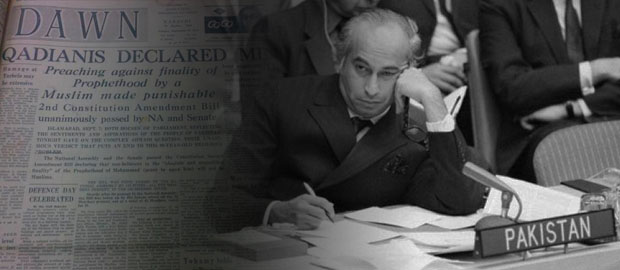The combined Opposition in the Pakistan Parliament has demanded that the Government should declare the Ahmadiyya sect, a non-Muslim minority, remove all its members from influential and sensitive offices, and arrest Mirza Nasir Ahmad, who describes himself as third Caliph of the sect.
The demand, which came yesterday, even from parties professing to be secular, followed a week of anti-Ahmadiyya agitation in Punjab. Today Opposition members walked out of the National Assembly after tear gas was used to disperse 2,000 people demonstrating outside a hostel for members, half a mile away.
His Holiness Mirza Nasir Ahmad, Third Caliph of Ahmadiyya Muslim Community.There is no way of knowing the real situation arising from the anti-Ahmadiyya agitation because of strict press censorship on all sectarian news in Punjab and Sindh. Unconfirmed reports, however, indicate that there have been attacks on members of the Ahmadiyya community and that looting and arson of their properties continue in a number of towns and cities in Punjab.
The Opposition has also demanded that press censorship on sectarian news and comments should be lifted and that restrictions on entry into Rabwah the headquarters of the Ahmadis, should be lifted.
Islam is a religion of multiple sects, but the Ahmadiyya one, founded by Mirza Ghulam Ahmad in 1879 in the Indian sub-continent, is the one most deplored by the average Muslim, particularly those of the majority Sunni belief. Its members have remained suspect in the eyes of Muslims in spite of the fact that Jinnah, in his struggle for Pakistan in 1946 and 1947 and Mr Bhutto, the Prime Minister, in his election in 1970 received invaluable support from economically and socially well-placed members of the sect.
It was in recognition of its support for the Pakistan movement that Jinnah appointed Sir Muhammad Zafarullah Khan, until recently president of the International Court of Justice at The Hague, Pakistan’s first Foreign Minister.
What seems to divide the sect, estimated to number 10 million, half of whom live in Pakistan and the other half spread over Africa, Indonesia and Europe, from the rest of the 500 million Muslims throughout the world, is the claim of the late Mirza Ghulam Ahmad that he was God’s promised Messiah, sent to lead Muslims as their prophet of Allah. The general Muslim belief is that there would be no true prophet of Allah after Muhammad.

In Pakistan, Muslim animosity towards members of the sect is not based merely on religious grounds. Economic and social reasons seem to play an equally important role in the constant friction’ between the communities. Muslims generally seem to resent that this well-knit and organized, exclusive sect occupies an influential economic and social position in the country which is far greater than its numerical strength.
Although there has never been a separate census of members of the Ahmadiyya sect, nor do they generally let their beliefs be demonstrated publicly, it is believed that many senior civil and military appointments are held by them and that a sizable number managed to enter Parliament and the provincial assemblies four years ago.
Until only recently two of the three services chiefs belonged to the community and at present three officers of the rank of general are reported to be holding command appointments. In the foreign service too, there are several ambassadors and senior diplomats of the sect and others among them run a chain of medium- sized industries and top-class restaurants.
Although Pakistan’s constitution debars non-Muslims from occupying the offices of President and Prime Minister, it does not stipulate precisely whether members of the Ahmadiyya community can hold these offices. It is this possibility which Muslims wish to avoid totally.
The Times, June 8, 1974

